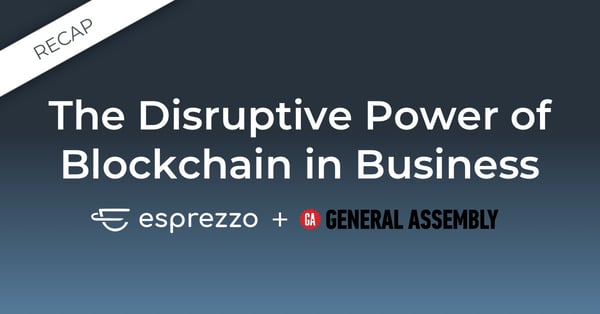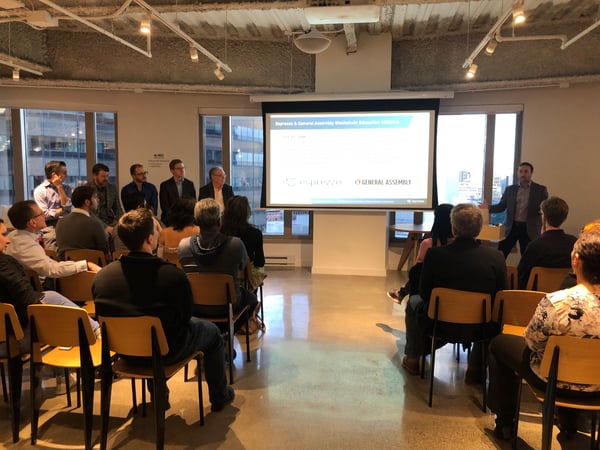
This past Tuesday evening we held our latest blockchain education event, The Disruptive Power of Blockchain in Business, at General Assembly’s Boston campus. While our previous events covered introductory topics such as Blockchain 101 and An Introduction to Crypto Trading, this panel discussion focused on the real world business applications of blockchain technology that are impacting traditional business processes today. Not tomorrow, not five years from now, but today.
As organizers for this event our goal was to provide attendees an inside look at how blockchain technology is already being used, and how it might impact their professional lives — probably sooner than they realize. While blockchain hype reached its zenith in 2017 with the ICO boom, 2018 brought a crypto winter that left many skeptics drawing parallels to tulip mania. But while the “experts” debated ad nauseam, innovation teams across the globe, spearheaded largely by Fortune 500 conglomerates, have been developing use cases and proofs of concept applying blockchain and distributed ledger technology to their everyday operations. Thanks to these innovation teams the ROI of integrating blockchain technology into day-to-day business processes is becoming increasingly clear. These case studies and industry-specific proofs of concept will be a pillar of mainstream adoption, when corporations start realizing there’s an opportunity cost of not using blockchain technology.
This tipping point may be closer than you think; the day of our event Forbes published Blockchain Goes To Work, which includes its first annual Blockchain 50, a list of 50 companies across the globe “that are putting the technology to work in meaningful ways” — complete with details of their blockchain focused endeavors and early benefits being reaped. The list includes many organizations who you may expect to see, the likes of JP Morgan, Facebook and Intel, but what about Bumble Bee Foods using a blockchain to provide complete transparency to its tuna supply chain all the way from the pole-and-line-catch fishermen sailing the South Pacific to grocery stores in the United States? Or CVS Health leveraging blockchain technology to publish tamperproof, unforgeable medical credentials so patients can check out their doctors? Much like cloud-storage did before it, this new technology will integrate itself seamlessly into the lives of consumers and businesses alike. Our panel of thought leaders helped drive home this point.
Finance and Banking
Andrew Rollins, CEO & Co-Founder of Everbloom, detailed the profound impact blockchain and distributed ledger technology is already having on the finance and banking industries. Everbloom is a venture-backed, non-custodial cryptocurrency exchange which allows individuals to trade cryptocurrencies without giving up custody by using the Ethereum blockchain to process transactions. This theme of end-user control was a common talking point throughout his presentation as he emphasized operational efficiencies provided by blockchain tech.
By disrupting the transfer of value and allowing individuals to send money directly to one another without a bank acting as a middle man, we’re creating a more open financial system accessible by anyone with an internet connection. This provides the opportunity to greatly increase access to capital and financial systems, lower fees for interacting with markets and moving money, and improve the transparency of money that moves around the globe. While progress is being made, Andrew was quick to point out that challenges remain and the status quo continues to rear its ugly head as most transactions are still being processed by centralized vendors (Coinbase, Binance, and soon also Fidelity).
Intellectual Property
Back in September 2018 Bennett Collen’s trademark protection company, Cognate, was acquired by GoDaddy where he now serves as a Senior Product Manager for their blockchain initiatives. At first, Cognate was little more than an online database of names but quickly grew to be a platform that empowered organizations to protect their trademark rights. Bennett recognized early on that by leveraging the Ethereum network, Cognate could create timestamped, tamper-proof histories of trademark use and associated rights all enforced by smart contracts powered by blockchain technology.
Leveraging this new technology provided security, transparency, and a level of credibility that can be difficult to come by if you’re a start-up without a long track record of success. Bennett and his team now have the (welcomed) challenge of incorporating their technology into the suite of products offered by GoDaddy. While Bennett discussed Cognate’s use of the Ethereum network and smart contracts for trademark protection, he also spoke to the work being done by the likes of IBM, Louis Vuitton and the European Intellectual Property Office at a global scale to combat counterfeit products that penetrate the supply chain resulting in millions of dollars lost and brand damage.

Panelists from left to right: Andrew Rollins of Everbloom, Chris Allen of Red5 Pro, Michael Raybman of Level K, Bennett Collen of GoDaddy & Dr. Ron Ribitzky of R&D Ribitzky
Healthcare
Dr. Ron Ribitzky, the lead author of the most downloaded article from Blockchain in Healthcare Today, helped the audience understand the massive potential for disruption and corresponding opportunity when applying blockchain technology to the global healthcare market. The global blockchain in healthcare market is expected to grow at an annual rate of 63.85% from 2018 to 2025, to reach a value of $5.61 billion by 2025. The use of blockchain for healthcare data exchange will contribute the largest market share throughout the forecast period, reaching a value of $1.89 billion by 2025. However Dr. Ribitzky was quick to point out that adoption does not happen overnight and many milestones remain to be reached in regards to industry collaboration and technological advances. But we’re on the right track; Dr. Ribitzky characterized 2017 as the year of “thought-leader ideation expedition” into how blockchain might be applied to digital health, 2018 brought an entrepreneur drag-racing-esque fanfare into the space and now in 2019 we’re seeing early adopter use cases that show both the promise and potential of this transformative technology.
Real-Time Video Streaming
Chris Allen, the CEO and Co-Founder of Red5 Pro, highlighted the challenges associated with live, real-time video streaming at scale and potential solutions provided by blockchain technology. When you talk about the problems that surround real-time video streaming, it all comes down to latency. By today’s standards, you can expect anywhere from 10 to 45 seconds of latency from when the video is shot to when an individual views it on their screen. Now, this may not sound like a big deal; so what if you need to wait 30 seconds to see Steph Curry drain a 3 or Tiger sink a putt? It all comes down to interactivity. When it comes to online gaming or live auctions for example, 30 seconds can seem like a lifetime and have serious monetary implications.
In regards to IoT surveillance, real-time latency is critical for making informed decisions that will inevitably impact the lives and well-being of actual human beings. Red5 Pro already achieves real-time latency of under .5 seconds in a market that is expected to grow to $124.57 billion by 2025. However, as demand for live streaming increases so do the pressures on providers to meet user expectation amidst limited bandwidth. Allen thinks blockchain may be the answer. This emerging technology solves a myriad of issues for the businesses that operate in the live-streaming space and the end-user (customer) enjoys the benefits of lower network costs, the independence of not having one single entity control their data and they avoid the need to set up and manage servers to receive their content.
Software Development
Michael Raybman is a Product Architect at Level K, a consulting firm providing custom decentralized application (DApp) development and smart contract auditing services for companies exploring potential blockchain solutions. This means he’s on the front lines of DApp development in today’s business ecosystem. He understands better than most when blockchain technology is applicable and when it’s not. He also has his finger on the pulse in regards to which companies within a certain industry are searching for a competitive advantage by leveraging blockchain technology. Naturally, you can only be so transparent when discussing the work you’re doing for clients but when asked in what industry are you spending most of your time, he replied “finance” without skipping a beat. The projects he’s worked on include applying blockchain technology to asset representation, payments, governance models and brokerless trading. It seems the regulatory ambiguity surrounding financial markets and its applications of blockchain technology is doing little to slow down real-world innovation.
According to Deloitte’s 2018 Global Blockchain Survey, when asked, what are your organization’s barriers, if any, to greater investment in blockchain technology? Respondents answered 1) Regulatory Issues (39%) 2) Implementation / Replacing Legacy Systems (37%) and 3) Lack of In-House Knowledge (28%). Before opening it up to the audience for questions I asked the panelists if they thought these barriers will still exist in their industries throughout 2019? While everyone did nod “yes” in unison, they were quick to point out these barriers have diminished exponentially since this time last year and with the continued discovery of successful case studies and transformative proofs of concept, they all expect adoption to increase.
Thank you to all the panelists and everyone who attended! For those who are looking for the presentation from the event, get it here.
This was the third event we organized as part of our partnership with General Assembly to provide blockchain education, and we look forward to meeting you at future events! What do you want to learn and where would you like to attend future events? Take our short survey and let us know.


